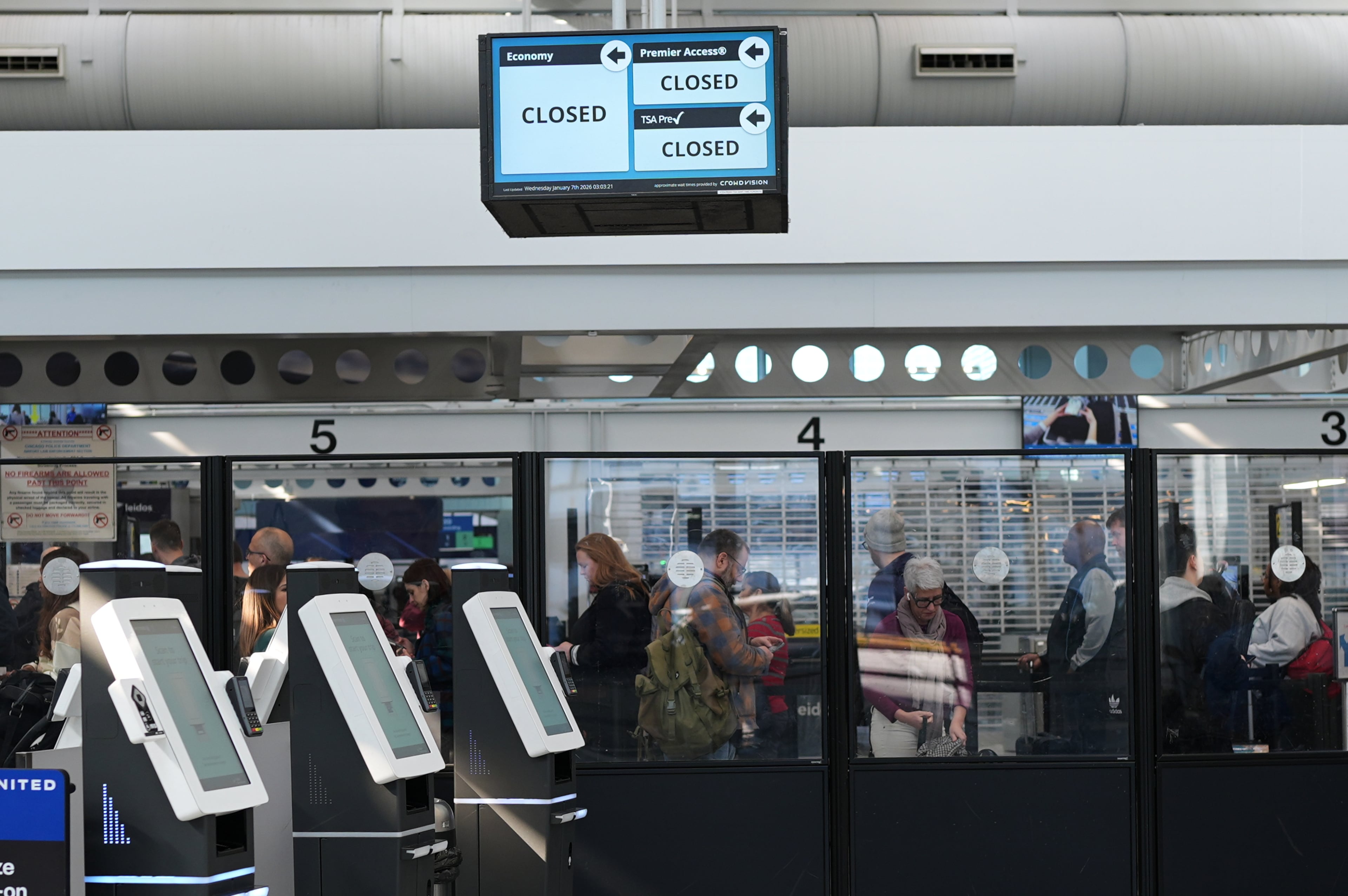5 questions about the looming federal government shutdown
Today’s newsletter highlights:
- Federal candidates race to raise money ahead of disclosure deadline.
- Federal exemption expires for electric vehicle drivers.
- Illinois governor to headline Georgia Democratic dinner.
Shutdown showdown
It’s deadline day in Washington.
Unless Congress passes — and President Donald Trump signs — a bill to keep the government funded, then the single largest employer in the United States will shut down at midnight.
The consequences would be swift for the tens of thousands of federal workers in Georgia, depending on how long the drama drags out. But the political impact could linger much longer.
Here are five questions about the crisis:
1. Why would the government shut down?
Government agencies need permission from Congress to spend money each year. The new federal fiscal year starts tomorrow and Congress hasn’t authorized new spending. The House passed a bill to keep the government funded through Nov. 21. But it didn’t pass in the Senate. Republicans control both chambers.
2. Why hasn’t Congress pass a funding bill?
Republicans don’t have enough votes in the Senate. Although they are the majority, they need eight Democrats to join them. But Democrats are insisting any government funding bill must also extend health insurance subsidies scheduled to expire at the end of the year. Republicans say they’re willing to discuss that, but not as part of a government funding bill. Democrats also want assurances that any funding deal includes language prohibiting President Donald Trump from cutting approved spending later.
3. What would the impact be in Georgia?
Nonexempt federal workers would be put on leave and stop getting paid, and the Trump administration says there would be mass layoffs. Some workers deemed essential, including airport security and air traffic controllers, would keep working without pay. Travelers might face longer lines at the airport and there could be extended wait times to renew passports, reach the IRS or sign up for veterans benefits.
4. How has Georgia’s congressional delegation reacted?
About how you would expect with the current partisan divide. Democratic U.S. Sen. Jon Ossoff, who is running for reelection next year, has portrayed the battle as a fight to “prevent a massive increase in health insurance premiums for Georgia families.” His Republican opponents, including U.S. Rep. Buddy Carter, have accused him of “holding the government hostage.”
5. How would a shutdown impact the 2026 Senate race?
It depends on how long a shutdown lasts. Threats to shut down the government are so common now that voters typically respond with a shrug as the deadline approaches. But that would change if the shutdown lingers to the point that it impacts funding for popular programs such as Medicare, Social Security and disaster aid.
Things to know

Good morning! We’re 35 days away from a statewide election to fill two seats on the Public Service Commission and municipal elections for local government seats across the state.
Here are three other things to know for today:
- Atlanta Mayor Andre Dickens said he is working behind the scenes to avoid a federal law enforcement takeover after President Donald Trump sent federal troops to Los Angeles and Washington, D.C., the AJC’s Riley Bunch and Tia Mitchell report.
- Republican state Sen. Greg Dolezal of Cumming is running for lieutenant governor, pledging to crack down on violent crime, end diversity programs in public agencies and oust “rogue” prosecutors, Greg Bluestein reports.
- Democratic state Rep. Ruwa Romman of Duluth is running for governor, aiming to carve a progressive lane in a field of high-profile contenders, Bluestein reports.
Georgia weighs in
Republicans in the state Legislature fired off letters Monday urging federal lawmakers to pass a “clean short-term funding extension” to avoid a shutdown that could temporarily shutter many government offices across the nation.
“Holding the federal government funding hostage is not just a Washington D.C. debate for political points, it has real and immediate consequences in every state across America that cannot be overlooked,” read the letters from the GOP-controlled House and Senate.
The same line was also included in a third letter from the Republican Governors Association, which is chaired by Georgia Gov. Brian Kemp.
And a fourth letter, led by Republican Agriculture Commissioner Tyler Harper with eight fellow state agriculture commissioners had — you guessed it — the same line, too. But the commissioners’ letter warned that a shutdown would stop payments to farmers from existing disaster and farm safety net programs in the U.S. Department of Agriculture. They called on Congress to pass a “clean Continuing Resolution,” which is GOP leaders’ preferred option, to avoid that outcome.
Pressure cooker

It’s crunch time. U.S. House and Senate candidates have until midnight to rake in contributions before the fundraising window closes on the July–September quarter. That means your inbox is about to fill up with even more urgent appeals as the clock runs out.
- Former football coach Derek Dooley is looking to make a splash with a multimillion-dollar debut haul, boosted by both Gov. Brian Kemp’s endorsement and access to his vast donor network.
- U.S. Rep. Mike Collins is hustling to prove he can keep pace, even though Kemp is icing him out. He’s landed a heavyweight backer in railroad executive Ben Tarbutton III as his finance chair, and those connections are being put to the test.
- U.S. Rep. Buddy Carter faces less pressure to put up a big number since he’s expected to bankroll much of his campaign, with an adviser signaling he’ll spend more than $10 million — though so far he’s only put in a fraction of that.
All three are trying to impress President Donald Trump, who is said to be keeping close tabs on the reports before deciding whether to endorse or stay neutral.
U.S. Sen. Jon Ossoff, meanwhile, continues to build one of the biggest war chests in the nation. He’s already raised more than $21 million this year and had $15.5 million in the bank as of June.
We’ll also be looking to see what dollars primary challengers to U.S. Reps. Andrew Clyde, R-Athens, and David Scott, D-Atlanta, are able to raise. Reports are due in mid-October.
Three of Scott’s Democratic opponents — former Gwinnett County Board of Education Chair Everton Blair, state Rep. Jasmine Clark and reality star Dr. Heavenly Kimes — were spotted hobnobbing in Washington last week during the Congressional Black Caucus’ annual convention. That gave them a chance to rub elbows with party activists and potential donors.
If you’re waiting on disclosures from gubernatorial or other statewide contenders, you’ll have to sit tight. Their next reports aren’t due until early 2026.
End of an era

A big perk of driving an electric vehicle disappeared overnight.
Since 2015, Georgia has exempted electric vehicle drivers from tolls and let them use the high occupancy vehicle lanes on interstates even if they don’t have anyone else in the car.
That changed at midnight when a federal exemption expired. Going forward, all electric vehicles must have two or more people to legally use the HOV lanes. They are also no longer exempt from paying certain tolls.
The exemption was rooted in another era of public policy, when the federal government was trying to encourage more people to drive electric cars. That thinking has changed under the Trump administration.
President Donald Trump’s big tax and spending law ended popular tax credits for electric vehicle purchases. In fact, today is the last day you can buy a new or used electric car and benefit from a federal tax credit.
2028 is coming
Georgia voters are still recovering from the flood of ads from the 2024 presidential election. But they won’t have much time to rest as the 2028 contest heats up this week.
Illinois Democratic Gov. JB Pritzker will be the keynote speaker of the Democratic Party of Georgia’s Carter-Lewis Dinner on Friday.
First elected in 2019, Pritzker said he’ll run for a third term next year. But in a pair of national interviews last month, he didn’t close the door on running for president.
Pritzker’s trip to Georgia won’t tamp down any rumors. While Georgia is not a pivotal primary state, it’s become essential to any candidate hoping to win a general election.
Other speakers scheduled for the dinner include Georgia U.S. Sens. Jon Ossoff and Raphael Warnock, Atlanta Mayor Andre Dickens and Democratic Party of Georgia Chair Charlie Bailey.
Heads up

Former Gov. Roy Barnes is expected to endorse former state Rep. Roger Bruce later today, giving the Democrat a major boost in the race for an open Cobb County-based state Senate seat.
Bruce is the early front-runner to replace Democrat Jason Esteves, who stepped down this month to focus on his campaign for governor.
The timing of the contest has already stirred controversy. As we reported yesterday, Gov. Brian Kemp drew criticism for setting the vote for Nov. 18. Democrats lobbied him to hold the election instead on Nov. 4 to coincide with Public Service Commission races and other contests already on the ballot.
They argued it would save money and boost turnout in PSC races they hope to flip blue.
But it’s not just Democrats complaining. Cobb County Republican Party Chair Mary Clarice Hathaway also criticized the Nov. 18 special election date, saying it could fuel “voter fatigue” and other complications.
“There’s 10 reasons why it makes more sense to have it Nov. 4, and maybe not create extra confusion,” Hathaway told The Marietta Daily Journal. “Or put ourselves in a position where there’s probably going to be a very low voter turnout on that day.”
Listen up

Today on the “Politically Georgia” podcast Democratic state Rep. Ruwa Romman of Duluth joins the show to talk about her campaign for governor. Then author Bill Johnstone discusses his new book on former Georgia Democratic U.S. Sen. Wyche Fowler.
You can listen and subscribe to Politically Georgia for free at Apple Podcasts, Spotify or wherever you get your podcasts.
Have a question or comment for the show? Email us at politicallygeorgia@ajc.com or give us a call at 770-810-5297 and you could be featured on a future episode.
Today in Washington
- President Donald Trump will join Defense Secretary Pete Hegseth for a meeting in Virginia with top military officials.
- The House is out this week, although Democrats have news conferences and events planned to highlight their position on government funding.
- The Senate is expected to take another vote on the Republican proposal to fund the federal government through Nov. 21, a last-ditch effort to avoid a shutdown.
Shoutout

Transition:
- Lt. Gov. Burt Jones is reshuffling his senior staff as he runs for governor. His longtime top aide, Loree Anne Paradise, will become his senior adviser. Brad Vaughan is stepping in as chief of staff and executive counsel. And Ines Owens is taking on an expanded role as legislative and communications director.
Want a birthday shoutout in the Politically Georgia newsletter? There’s a form for that. Click here to submit the shoutouts. It’s not just birthdays. We’re also interested in new jobs, engagements, birth announcements, etc.
Before you go
The Republican Party’s campaign arm for U.S. Senate races is planning to hold a retreat on Sea Island this weekend, raising eyebrows about timing amid the potential government shutdown. Politico first reported the event and said the National Republican Senatorial Committee didn’t say if it would be canceled if a shutdown occurs.
That’ll do it for us today. As always, you can send your best scoops, gossip and insider info to greg.bluestein@ajc.com, tia.mitchell@ajc.com, patricia.murphy@ajc.com and adam.beam@ajc.com.
More Stories
The Latest






